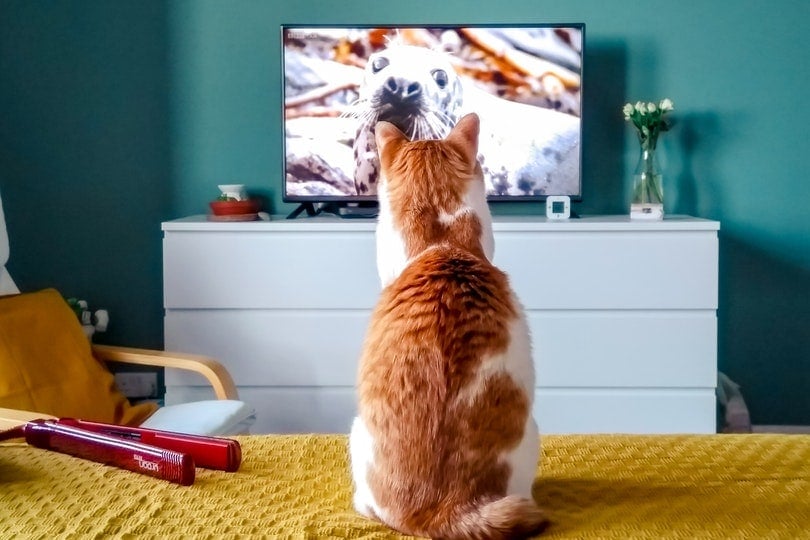When Can I Hold a Kitten? Safety Tips & Concerns Explained
Updated on
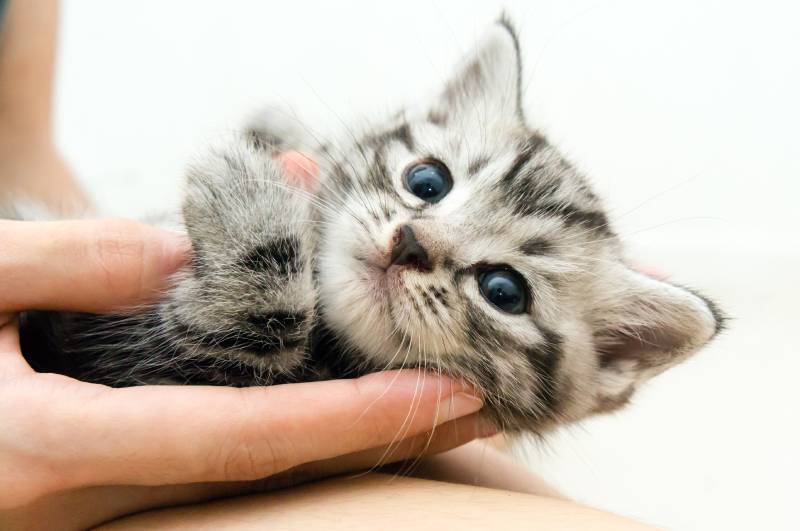
Click to Skip Ahead
Newborn cats don’t need socialization immediately in order to adjust to human interaction. Instead, it’s best if they spend the first several weeks with their mother and without any interaction with humans if at all possible. There are several reasons for this. The biggest reason is that kittens rely on their mother for around-the-clock care, just as human babies do.
However, unlike humans, a cat mom may reject a kitten if it’s been removed from the “nest.” This is why you should always wait to hold a kitten for at least 2 weeks after they’ve been born. So, when can you safely hold a kitten?
The 3 Tips to Know When to Safely Hold a Kitten
You should consider the following three rules when determining when you can finally hold a kitten after they’ve been born. Remember that every litter of kittens and every kitten in the litter is unique.
1. Starting at 2 Weeks
Once kittens are 2 weeks old, their eyes should be open, their ears developed, and their sense of curiosity well established. At this point, it’s usually safe to start gently touching or petting them. You should always wash your hands before interacting with young kittens, as they have not yet had any vaccinations and their immune systems are still immature.
If their eyes are not open at 14 days, you should contact a vet for guidance.
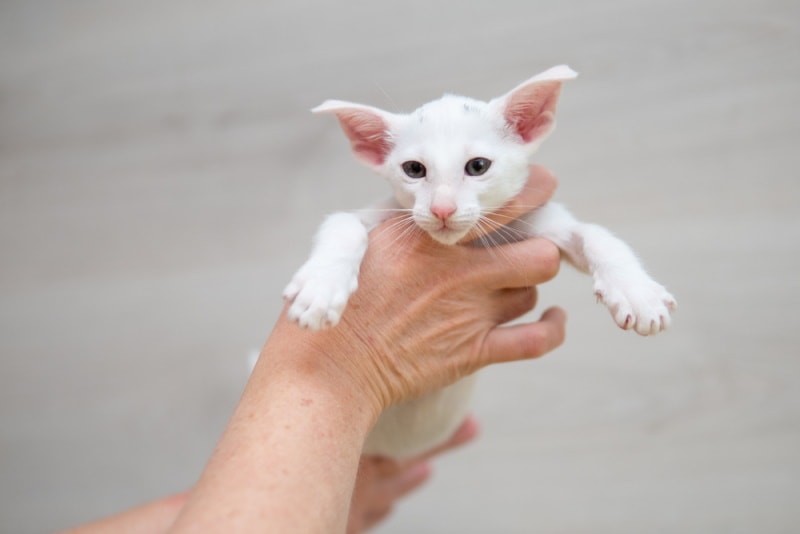
2. When the Mother is Okay with It
No matter what age they are, you should only interact with kittens if their mother is okay with it. If she seems anxious about you holding her younglings, you should attempt to pet or hold them only when she is in another room or sleeping. This will allow you to begin socializing with them while she is not stressed out.
If their mother is nervous about you holding a kitten, the kitten is likely to feel nervous as well. This can make them associate interaction with stress and anxiety.
3. For Short Periods
When first interacting with newborn kittens, only do so for very short periods. You might only pick up a kitten for a few seconds, making sure to use both hands, before setting them back down. Once they are comfortable being held for short periods, you can begin to interact with them a bit more, holding them longer and offering them more pets and playtime.
Remember, the mother is also adjusting to the amount of time you spend holding her babies, so be mindful of her reactions during this time as well.
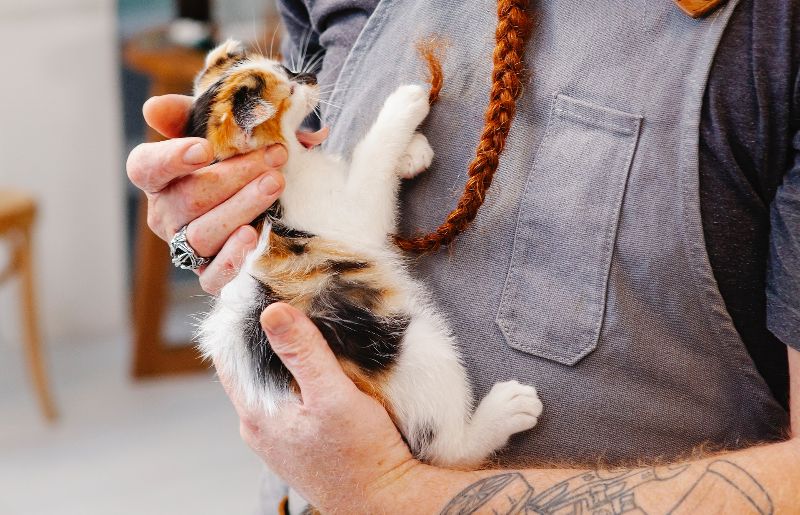
 Top 3 Considerations When Holding a Kitten
Top 3 Considerations When Holding a Kitten
1. Exposure and Socialization
Handling a young kitten is only the first step in creating a well-socialized kitten. You should continue working with them, holding them for short periods of time until you can play with them regularly. Eventually, you will get to have fun introducing them to their larger environment and many more people.
2. Their Environment
Once kittens have adjusted to being held and petted regularly, you’ll notice that they naturally want to explore their environment. Their mother will slowly let them, too, allowing them to go a bit farther out from the nest. At this time, it’s safe to expose them to new things. You should begin playing with them on different surfaces, such as hard flooring, carpet, textured rugs, and more. You should be mindful of taking them outdoors, however, especially if they have not yet had their vaccinations.
Sounds are also an important part of exposure for young kittens. You don’t want them to be nervous around loud noises as they get older, so run the vacuum cleaner, a blender, have the TV or music playing, and run the washing machine. If noises scare them at first, have them go to an adjacent room the first several times so they can adjust slowly.
Your curious kittens will want to smell and climb on new things. Use blankets, books, and other household objects on the floor for them to explore. Change these out regularly to help stimulate their curiosity and so they can learn new things about their environment. Introduce plenty of cat toys and different types of treats so they can learn what they like and don’t like.
During this time, be sure you are handling them regularly. Pick them up while they are exploring, even if they feel they were interrupted. Give them plenty of love and affection. Let the mother see that they are nearby but having fun. She might even want some of this attention, too!
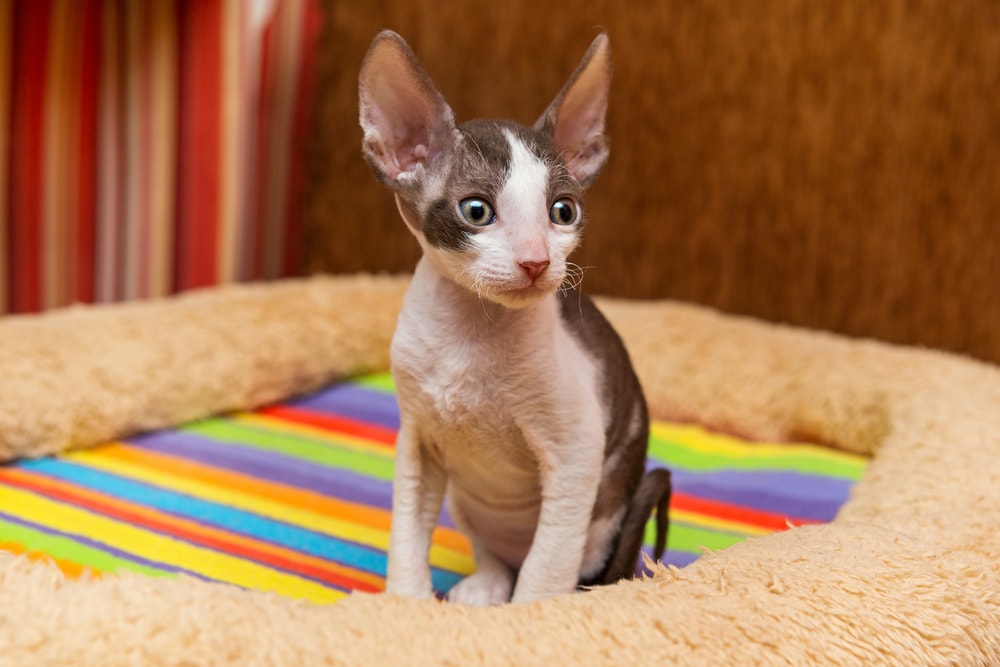
3. New People
Kittens should interact with as many people as possible during this time. This helps them adjust to meeting new people, so they aren’t anxious when doing so as adults. These should be a variety of people with different characteristics. If you don’t have many people visiting your home, you could always take your kittens on a playdate to a friend’s home. Be sure to allow your kittens to interact with children as well.
A well-socialized kitten is sure to be a well-behaved adult cat who welcomes new visitors to your home instead of shying away from them or becoming aggressive.
 Exceptions to the Rules
Exceptions to the Rules
There are very few exceptions to the above-mentioned rules. Kittens who have not yet opened their eyes should not be handled by humans and should remain in their mother’s care. However, there are reasons you may need to intervene in the birthing process, such as if the mother is having a difficult labor, a kitten is not moving or breathing, the mother is not caring for a newly born kitten, or a kitten is not suckling.
You may also find an abandoned kitten or litter outdoors. In this case, it’s important not to intervene too early, as a mother cat could return to her litter and find her kittens missing. However, you also don’t want to see the kittens harmed. In this case, contact your local animal control and ask for their recommendations. They may suggest watching for the mother or, if you are willing to, bringing them indoors or moving them to a safer location nearby where the mother may still find them. However, even if you reintroduce the mom to her kittens, she may turn them away or become aggressive toward them, so this should only be done if absolutely necessary.
 How to Handle Newborn Kittens
How to Handle Newborn Kittens
If you do need to hold or move a newborn kitten for any reason, you should do so carefully. There are a few guidelines you should follow when handling a newborn kitten so that the kitten is safe and to ensure that their mother knows as much. Being mindful of both the kitten and mother will ensure that both trust you during the short time you are holding them and that the mother accepts the kitten back into the litter once placing them back in her loving care.
- Always wash your hands
- Wear gloves (if possible)
- Make sure the mother can see their kittens at all times
- Use two hands to hold them
- Keep the kittens upright (belly-down)
- Monitor their temperature (they chill easily)
- Only hold them as long as necessary
- Stroke kitten and mother when offering them back
Conclusion
Newborn kittens rarely need interaction from humans before 2 weeks old to become well-socialized adult cats. It’s safest to leave them in the care of their mother until their eyes are open and they become curious about the world around them. Then, you can help them explore their surroundings and start to introduce them to your friends and family.
Featured Image Credit: Top Photo Engineer, Shutterstock

 Top 3 Considerations When Holding a Kitten
Top 3 Considerations When Holding a Kitten

